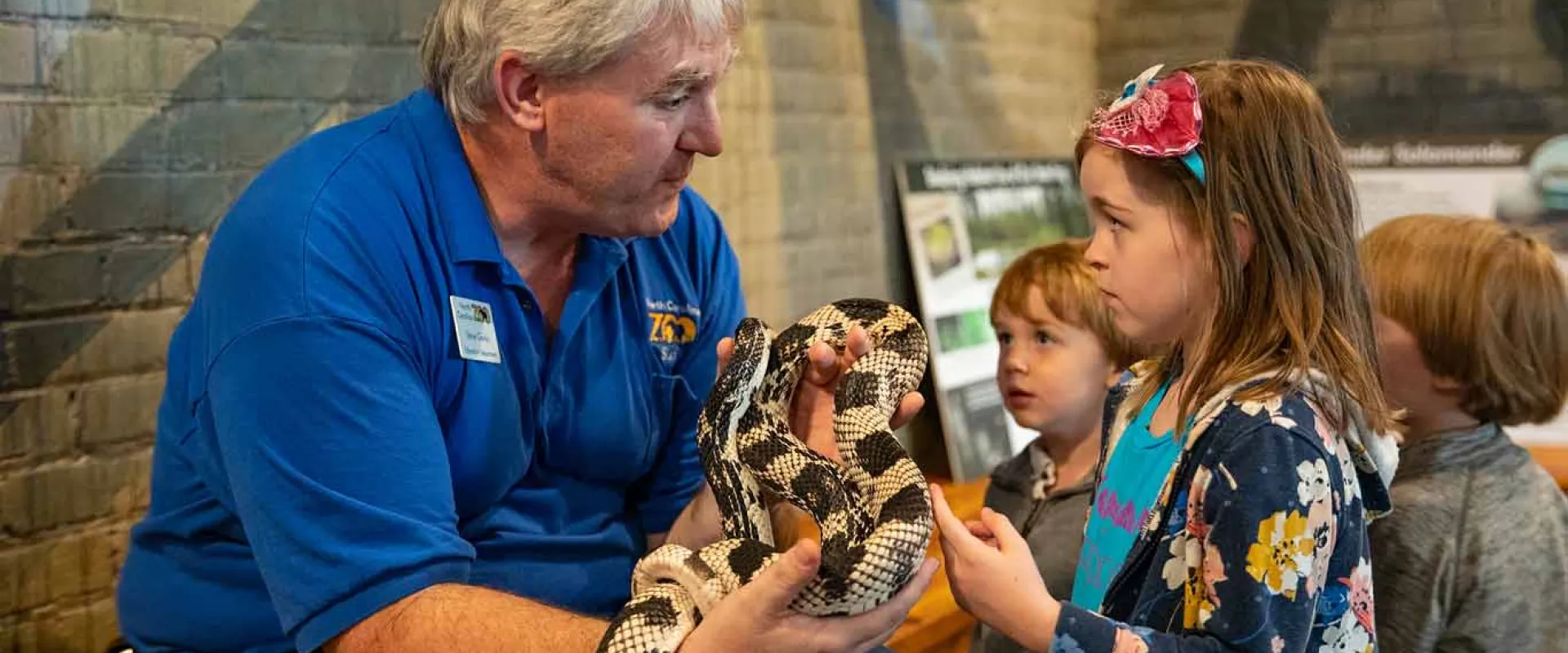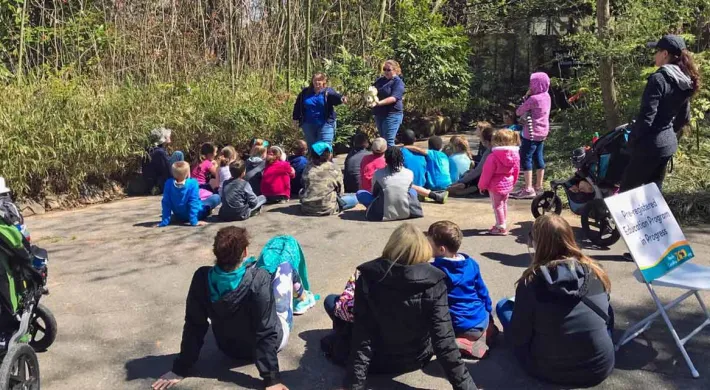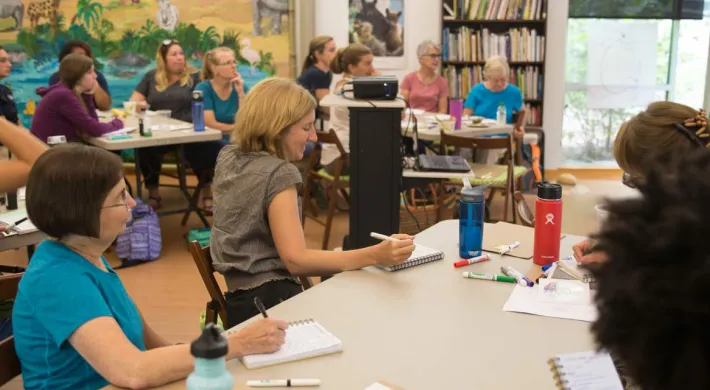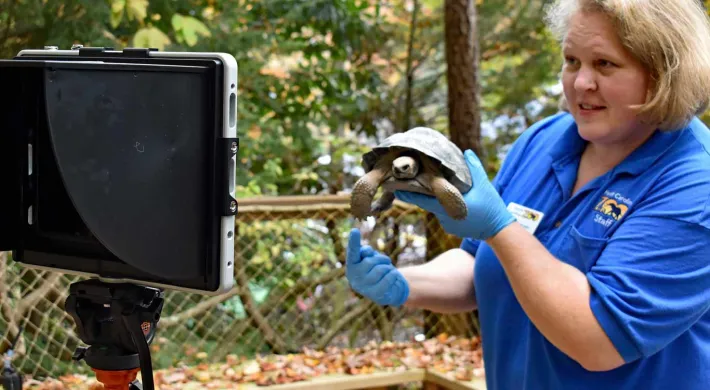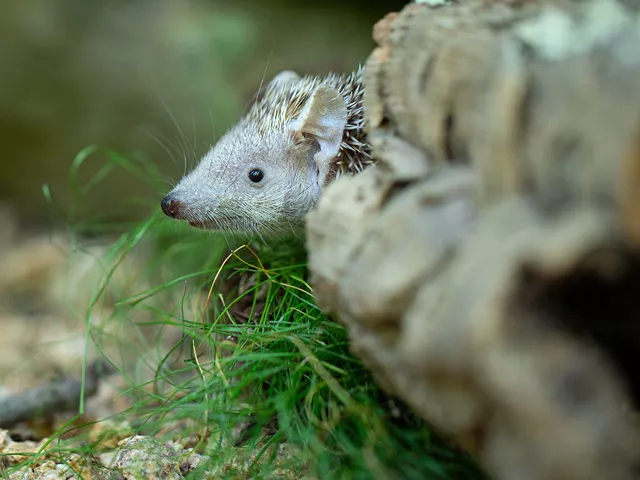
Off-Site Programs
Looking for a wild experience for your students? The North Carolina Zoo offers various engaging educational programs for school groups even for those unable to visit the Zoo. These programs enrich students' learning about animals, meet educational standards, and provide actions they can take to help protect and preserve Earth's natural resources. Our programs value hands-on experiences and participation in STEM activities.
To Schedule a Program
There is a minimum of four weeks notice for any program and full payment is due at the time of checkout.
- Choose a date here to for the zoo to come to your classroom or location with an educational program.
- If the desired date is available, continue with the online checkout process until you receive a confirmation screen. If the desired date is listed as sold out or unavailable, please email schoolprograms@nczoo.org as we do have some availability not listed on our ticketing site and may be able to accommodate your group.
- You will receive an email at the email contact provided on our ticketing site. Please respond to any questions we may have and we will do the same.
- As a final step you will receive a confirmation document showing the location, time, and date of the educational program you purchased. Review this document and respond with a final confirmation. You're all set to have the zoo visit!
For further information contact the North Carolina Zoo's School Programs Office via 336.879.7718 or email.
We serve a 90 mile radius of the zoo, provided the location is less than a two hours drive from the zoo.
Explore our Program Offerings
K-8th Grade
| Program Title | Suggested Grades | Descriptions | Standards | Location |
| Animal Wrappers | K-1st | From fur to feathers and scales to skin, explore how animals’ unique "wrappers" help them survive in Arctic chills, desert heat, and forest ponds! Designed for K–1st grade learners, this interactive program features hands-on biofacts, and a fun habitat-matching game to inspire young conservationists to help wildlife in their own backyards. | PS.K.1.1 | LS.K.1.2 | LS.1.1.1 | LS.1.1.2 | At the Zoo or Zoo to You |
| Eggs to Legs | 1st-2nd | Wiggle, hop, and crawl through the incredible life cycles of frogs, insects, and turtles! In this hands-on program designed for 1st–2nd grade learners, students will explore how animals grow, change, and overcome challenges at every stage of life. Through interactive movement, storytelling, and conservation connections, students discover how the North Carolina Zoo gives young animals a HeadStart—and how they can help protect wildlife too! | ESS.13.1 | ESS1.3.2 | LS2.1.1 | LS.2.1.2 | LS.2.2.1 | At the Zoo or Zoo to You |
| Plant Partners | 1st-3rd | From roots to blooms, plants can’t thrive alone! This engaging program, uncover how animals, soil, and the environment all play a role in helping plants grow. Students explore plant life cycles and get hands-on with real biofacts. Along the way, they’ll learn how the plants thrive at the North Carolina Zoo and Botanacle Garden and how they can help plants thrive too! | LS1.1.1.1 | LS.1.1.2 | ESS.1.3.2 | LS.3.2.1 | LS.3.2.2 | LS.3.3.1 | LS.3.3.2 | At the Zoo or Zoo to You |
| Amazing Adaptations | 4th-5th | Dive into the world of amazing adaptations! Explore how animals survive using external, internal, and behavioral adaptations! With real animal examples and biofacts, learn how the NC Zoo cares for the animals at the Zoo and in the wild and what happens when environments change too fast. | LS.4.1.1 | LS.4.1.2 | LS.4.1.3 | ESS.4.3.1 | ESS.4.3.2 | ESS.4.3.3 | LS.5.2.1 | LS.5.3.2 | LS.6.2 | LS.6.2.2 | At the Zoo or Zoo to You |
| Carolina's Coolest | 4th-6th | From sea turtles to salamanders, North Carolina is home to amazing animals, and the NC Zoo is working to protect them. In this engaging program ,students explore wildlife across the state’s mountains, piedmont, and coast lines. Discover how people can help animals thrive even in their own backyards! | ESS.4.3.1 | ESS.4.3.2 | ESS.4.3.3 | LS.5.2.1 | LS.5.2.3 | LS.5.2.2 | ESS.6.3.2 | At the Zoo or Zoo to You |
| Wild Genetics | 7th-8th | Dive into the fascinating world of animal genetics and discover how the North Carolina Zoo uses science to save species like red wolves and rhinos from extinction. Explore real-life challenges in managing breeding programs to conserve species, while applying classroom genetics to hands-on problem-solving. Get ready to think like a conservation scientist and help protect wildlife through genetics! | LS.7.2.1 | LS.7.2.2 | LS.8.3.1 | LS.8.3.2 | At the Zoo or Zoo to You |
| Organism Organization | 5th, 7th-8th | What do a polar bear, a snake, and you have in common? A lot more than you think! In this program, we’ll explore how all living organisms are built and maintained through organized structures like cells, tissues, organs, and systems. Students will compare body systems, and discover how Zoo veterinarians apply this knowledge to care for wildlife. Plus, we’ll spotlight some of the animals at the North Carolina Zoo and learn how understanding health and structure helps protect animals both in human care and in the wild. | LS.5.1.1 | LS.5.1.2 | LS.7.1.1 | LS.7.1.2 | LS.7.1.3 | LS.7.1.4 | LS.8.1.1 | LS.8.3.1 | At the Zoo or Zoo to You |
9th-12th Grade
| All our high school programs are upon request and can be customized for any group, topic, or standard. We highly encourage our programs to also include an extension activity or project, whether facilitated by our educators or by the classroom teacher! Here are some examples of programs we have done in the past: | |
| 45 minute - 1 hour Educational Programs | A zoology class had an increased interest in symbiosis in animals. We provided an educational program with a live animal ambassador, allowing students to ask more in depth questions about specific species. |
| An Earth Environmental class was covering conservation work and reached out to see what materials we could provide since the North Carolina Zoo is so active in conservation work. We provided an educational program about our work and Red Wolf SAFE, and led students in a short debate on if coyotes are a nuisance species or an invasive species. | |
| A nutrition class was interested in how we incorporate nutrition into our animal care. We were able to have students meet a live animal ambassador and discuss their unique dietary care. | |
| A horticulture class was able to tour the compost area and discuss the importance of composting throughout the zoo. | |
| A physics class discussed the physiology of animals that allowed them to move in the most efficient manner. We had a live animal ambassador present for students to make observations about and relate back to physics terms. | |
| Longer educational experiences | An afterschool group of high schoolers had an interest in dinosaurs. We provided an educational program about the archaeopteryx, and led students in a short student led debate: bird or dinosaur? We then led a community science birding hike for the students as an extension. (~2hr) |
| A herpetology club wanted a hands on herpetology experience. We provided a species spotlight program with a live animal ambassador, a community science salamander hike aiding in research at the Zoo, and a project to create a toad abode for the club to place outside their classroom. (~4-10hr) | |
| An Earth Environmental class participated in water quality community science through chemical testing, macroinvertebrate identification, and a short species spotlight for a bioindicator live animal ambassador. (~4-10hr) | |
Frequently Asked Questions
What price will the program be?
Prices start at $150 for a class sized program, $200 for less than 100 students, and $250 for 100-200 students.
Are there discounts available?
Yes! Please contact schoolprograms@nczoo.org to see if you qualify.
Do I have to purchase the program online?
Unfortunately, we are not able to reserve dates for school groups and the educational programs are first come first served. You can however reach out to schoolprograms@nczoo.org to see if a date has additional availability if it says sold out or unavailable, as we do have some additional availability not listed on the eTix site.
Can you sign a contract with my county/school/group?
Unfortunately, we are not able to sign any contracts or agreements. Please reach out to schoolprograms@nczoo.org to determine if there are other options for you.
For further information contact the North Carolina Zoo's School Programs Office via email.
